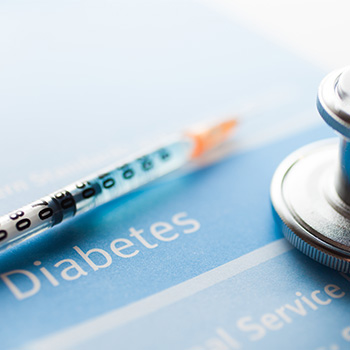Juvenile Diabetes Comorbidity

When to Seek Professional Help
Sometimes, children and teens with diabetes develop more serious emotional reactions requiring professional help. The most common are listed below:
Depressive Disorder. Seek help if the following symptoms last more than 2 weeks.
1. Depressed Mood
2. Loss of interest in activities/hobbies/social interaction
3. Sleep Disturbance
4. Significant weight loss/gain (not secondary to the onset of diabetes)
5. Agitation or apparent “slow” movements
6. Fatigue
7. Feelings of hopelessness/helplessness
8. Feelings of worthlessness
9. Difficulty concentrating or making decisions
10. Suicidal thoughts/self-harm
11. Important areas of functioning are being affected (such as grades, loss of friends, and neglect of diabetes management)
Anxiety Disorder. Seek help if symptoms are beginning to affect areas of functioning such as school, family life, and socialization.
1. Panic attacks
2. Excessive Worry/Fear
3. Sleep disturbance
4. Difficulty concentrating
5. “On edge”
6. Irritability
7. Muscle tension
8. Avoidance of social situations or other possible triggers of anxiety.
9. Compulsive Behavior
“Diabulimia”. This refers to skipping insulin doses to lose weight. Failing to take one’s insulin causes blood sugar levels to rise and results in frequent urination, as the kidneys must work overtime to rid the body of the excess sugar in the bloodstream. This “purging” of the sugar from the body results in rapid weight loss. Unfortunately, this is common trend especially among teenage girls. Recent studies found as many as 30 percent of teenage girls with type 1 have skipped or restricted insulin doses in order to lose weight. Seek help immediately if any symptoms are present.
1. Changes in eating habits
2. Unexplained weight loss
3. Unexplained hyperglycemia
4. Low energy levels
5. Frequent urination
6. Fear of gaining weight or becoming fat
7. Disturbance in the way in which one’s body weight or shape is experienced
8. Undue influence of body weight or shape on self-evaluation
9. Denial of seriousness of low weight
10. The absence of consecutive menstrual cycles
11. Binge eating
To schedule an appointment for an initial appointment, please call (702) 240-8639. Our administrative team is ready to answer your phone call Monday-Friday 8:00am-5:00pm. If we are busy assisting other clients or away from our desk, we ask that you leave a message, and we will return your phone call within two business days. You may also reach us via email.
Your first appointment will be with a mental health provider. If you are a child or adolescent, your parent or guardian will be with you during this appointment. During this initial visit, your provider will explain the expectations of treatment and ask questions to get to know you. Your provider will also initiate an extensive Biopsychosocial Diagnostic Interview asking questions about your presenting problems, current living situation, family history, relationship history, medical history, academic/employment history, nutrition, lifestyle, and other pertinent information. This allows your provider to properly diagnose the issues, assess your current needs, and work with you to build an individualized treatment plan for future sessions.
Foundations Counseling Center is in-network with most insurances. Most policies include mental health benefits and pay for services, as long as treatment meets medical necessity. Others cover only a limited amount of sessions. Some insurance policies pay for 100% of the services. Others apply co-pays, co-insurances, and deductibles for services, leaving you financially responsible to pay a portion. Most insurance companies cover all mental health conditions. Others exclude certain diagnoses and certain outpatient services. It is best if you contact your insurance company to learn and understand the benefit details of your insurance coverage.